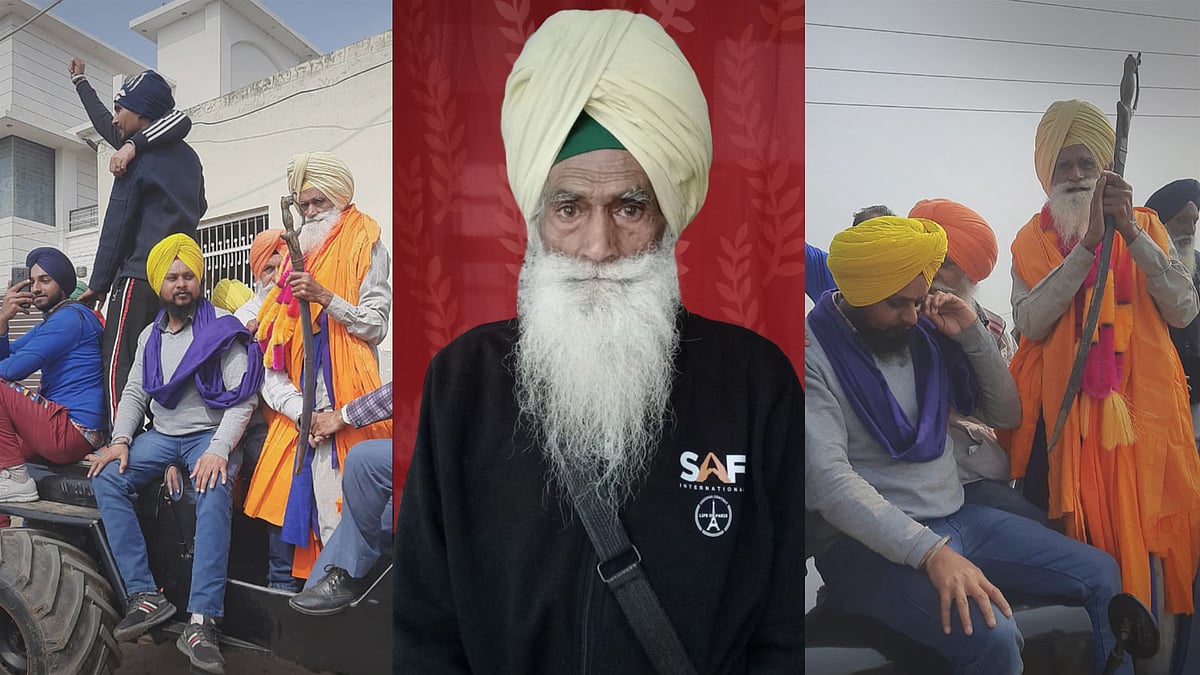‘Why is it wrong?’: Singhu farmers ask why media is upset if they get support globally
Few protesters, though, are aware of Rihanna’s or Greta Thunberg’s tweets, and fewer know about the toolkit over which the Delhi police have filed an FIR.
It’s nearly three months since farmers began protesting along Delhi’s borders, demanding repeal of the three new farm laws brought by the Narendra Modi government last year. In that time, much of the Indian news TV has covered them negatively; TV news channels have even outright lied about the protesters, their motivations, and actions.
In the last couple of weeks, while the coverage has remained hostile, the “angle” of attack has changed: from being projected as the handiwork of Khalistanis, the protests are now being denounced as a “foreign conspiracy maligning India and threatening violence on the country”.
What sparked the change was Swedish climate activist Greta Thunberg sharing a toolkit early this month to help mobilise support for the protests. The Delhi police promptly filed an FIR on the charges of sedition, criminal conspiracy and promoting hatred against the creators of the toolkit, but without naming anybody. On February 13, they arrested Disha Ravi, who is associated with the India chapter of Greta’s Fridays for Future movement, for “editing and sharing” the toolkit.
The police also issued arrest warrants for Nikita Jacob and Shantanu Muluk, accusing them of helping create the document at the behest of the Poetic Justice Foundation, which they described, without publicly offering evidence, of being a “pro-Khalistan group” based in Canada.
Since then, Greta, the “toolkit case”, and Rihanna, an American popstar who tweeted in support of the farmer protests around the same time as the Swedish teenage activist, have dominated TV news. But what do the farmers – who are nightly targeted now for the alleged sins of Greta, Rihanna, and Disha – make of this change of tack by TV anchors?
Few of the protesters we spoke with were aware of Rihanna’s tweet or Greta’s, even fewer farmers knew about the toolkit.
Tajender Punia from Haryana was a rare exception. He had seen both the tweets, Rihanna’s and Greta’s. “I just want to say one thing: why is it wrong to talk about someone’s rights?” he asked. “If they saw the pain that’s here, whether on YouTube or read about it somewhere, and the pain resonated with them, why is it considered wrong for them to have put their point across and support us?”
Kulwan Singh, a farmer from Gurugram, Haryana, was grateful for the attention Rihann’s tweet drew to the protests. “I don’t use Twitter but I have heard that lakhs of people interacted with her tweet about the protest,” he said. “She has done a lot of good for the farmer protests.” Kulwan hadn’t heard about Greta or the toolkit.


However, gratitude was not a consensus. Talvinder Singh, from Hisar, Haryana, who did not know about Greta or the toolkit either, believed the only reason Rihanna tweeted about the protest was for publicity. “There is no other reason for this,” he said. “She wanted publicity by doing this and she has achieved it. It is through retweets that she was getting publicity and so we decided that we should ignore her, taaki uska nuksaan hoga.”
Kashmir Singh, a farmer from Nawanshahr in Punjab, admitted he hadn’t seen the toolkit but argued that the controversy around it was being created to ignite problems within the protest. “People who made the toolkit are our supporters and they were trying to help us,” he added. “This is propaganda to delegitimise them.”
‘The whole world is standing with the farmers’
Sitting beside Kashmir at a Singhu tea stall was Sarhan Singh, also from Nawanshahr. Asked what he made of the allegation that the protests were part of an “international conspiracy”, he said, “This is a protest of farmers, nobody from outside planned it. It is a result of our own thinking and understanding. Our leaders who are sitting with us have read the laws and they are guiding us. We are not working for any party and are only here for farmers.”
Kulwan argued that there was indeed truth to the “international angle”, but not in the manner TV news channels were presenting it. “The whole world is standing with the farmers,” he said. “They are asking others to stand with us and are helping us with resources. However, all this support was only extended after the protest started, there was no plan beforehand.”
Tajender explained this “international angle” by talking about his son, who is in college. “I have a son who is studying abroad now after finishing school here. If his father faces any problems here, in India, will he not help? Whatever help we are getting from abroad, they are our children, sisters and brothers and nobody else,” he said.
So, why is the media giving a negative spin to the international support for the farmer protests? Talvinder Singh claimed it was part of a larger plan.
“The reason why the media continues to harp on things like ‘international planning’ or ‘Khalistani funding’ is so that they can change people’s minds about the legitimacy of the protests. If they keep telling people one thing every single day, there will come a day when they will start to believe it. They will think to themselves ‘This could also be true’,” he explained.

Sarhan, who served in the army for 30 years, is also disappointed with the media’s coverage of the protests. “How could I be in the army for 30 years if I was a Naxalite or a terrorist, as the media likes to label me? I used to fight on the border and now I have come to fight for my rights. Only a person who does not have any love for their country can say such things,” he said.
In spite of getting mainly hostile coverage from the media, the farmers said they have sought to help out the journalists at the Singhu protest site. They showed us a “media room”, set up for mediapersons to rest and file their reports. Equipped with wifi and blankets, reporters covering the protest can even stay the night there and eat food from the langar.
“When the Haryana government cut off the internet in the area, reporters would have to travel at least five to six kilometers towards Delhi to file their stories. So we arranged wifi and a room only for them here so that they don’t face any problems and can sit here and file their stories easily,” said Tajender. Over a dozen reporters make use of the room daily, he added.
Is “Godi Media”, as the farmers describe the journalists who are seen to bat for the Modi government, allowed as well?
“We will not stop anyone from entering this room,” Tajender replied. “The media should show the ground reality as it’s and not be biased. Those who are being referred to as Godi Media have stuck strongly to their side of the story and aren’t showing the truth from the ground and that is why people are against them. Farmers are not against anyone, we’re just sitting here, having left our homes to demand our rights.”
Asked what they made of prime minister Modi saying he was “still open to talk” with the protesting farmers, Kashmir scoffed, “He has had five months to talk to us. They are making a joke out of this. He denies that we are farmers sitting here, should I write it down to prove that I am a farmer?”
Tajender added, “In a country where the peace has been compromised, the king of the country sits in a palace and speaks rubbish without coming to the ground. If he felt anything for the farmers, then he should have come to our stage and said his piece to us. This is all a show, he doesn’t have anything to say.”
Reiterating that the farmers wanted to get the new laws repealed, Kulwan asked why Modi was not acknowledging their concerns. We are his own people, he said. Why does he want to see us suffer?
He added, “As soon as he removes the three laws, we will pack our things and be on our way. If he doesn’t remove it then we will stay here, whether it takes six months or six years.”
 Toolkit, anti-nationals and George Soros: Separating cringe from fact
Toolkit, anti-nationals and George Soros: Separating cringe from fact ‘I fought 3 wars for this country and they call me a terrorist’: Why Gurmukh Singh won’t forget his humiliating arrest
‘I fought 3 wars for this country and they call me a terrorist’: Why Gurmukh Singh won’t forget his humiliating arrest